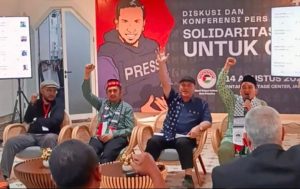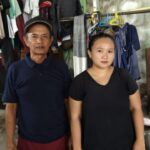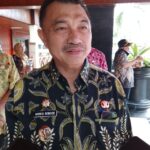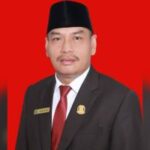JAKARTA – The Indonesian People’s Alliance for Palestine (ARI-BP) and the Indonesian Ulema Council (MUI) are urging Indonesian journalists, both in print and electronic media, to speak out more strongly against the brutality of the Zionist Israeli occupiers, particularly towards journalists and media workers in Palestine.
“We call on Indonesian and international journalists to raise their voices louder in demanding protection for journalists in Palestine,” said the Chairman of the ARI-BP Executive Committee, who is also the Deputy Secretary of the MUI Advisory Council, during the “Discussion and Press Conference on Media Solidarity for Gaza” in Jakarta.
Other speakers at the discussion and press conference included the Secretary of the ARI-BP Executive Committee, who is also the Vice Chairman of the MUI Foreign Relations Commission, and a Senior Journalist, with moderation by a Senior Journalist who is also the Deputy Secretary of the MUI Information and Communication Commission.
The discussion and press conference on media solidarity for Gaza were held in response to the emergency situation threatening the people of Gaza, particularly journalists and media workers who have been targeted and killed by Zionist Israeli forces.
It was previously reported that the Zionist Israeli occupiers killed journalists in Gaza, Palestine, on August 10, 2025. Five journalists died instantly after the media crew’s tent near Al-Shifa Hospital in northern Gaza was bombed by Israeli forces.
The five journalists were correspondents and photographers working for various media outlets.
The killing of the media crew was deliberate, following direct targeting. With these five deaths, the total number of journalists killed by Israeli occupiers in the Gaza Strip since the genocide began on October 7, 2023, has reached 304.
The number of journalists killed by the brutality of Zionist Israeli forces is the highest in history, surpassing even the deaths of journalists during World War I and II, the Vietnam War, and the Afghanistan War. In total, over 61,700 people have been killed due to Israeli atrocities, most of them women and children.
According to one speaker, the Israeli military’s bombing of journalists and media institutions is a clear war crime. The Israeli occupiers aim to silence the truth and erase evidence of genocide, preparing to cover up the brutal massacres they have committed and will continue to commit in the Gaza Strip.
Meanwhile, another speaker stated that saving the people of Gaza is not just about rescuing a specific group but an effort to save all of humanity.
“Saving our brothers and sisters in Gaza is not merely about protecting the people in that region but, in essence, about saving all of humanity,” they said.
They added that the recent killing of five journalists in Gaza is a grim example of the loss of humanitarian values in the world. Condemnation of the Zionist Israeli occupation in Gaza is not limited to Muslims but has spread globally, especially as Israel has also targeted the destruction of churches in the Gaza Strip.
Indonesian People’s Alliance for Palestine (ARI-BP)
The Indonesian People’s Alliance for Palestine (ARI-BP) is a solidarity movement in Indonesia that advocates for Palestinian rights and statehood. Formed by various civil society groups, activists, and religious organizations, it reflects Indonesia’s long-standing support for Palestine, rooted in shared anti-colonial struggles and Islamic solidarity. ARI-BP organizes protests, campaigns, and humanitarian aid efforts to raise awareness and pressure governments to back Palestinian self-determination.
Indonesian Ulema Council (MUI)
The Indonesian Ulema Council (MUI), established in 1975, is the country’s top Islamic clerical body that issues religious rulings (fatwas) and advises the government on Islamic matters. It plays a key role in shaping religious policies, promoting moderate Islam, and addressing issues like halal certification and interfaith relations. While influential, its conservative stances on topics such as blasphemy and morality have sparked debate in Indonesia’s diverse society.
Al-Shifa Hospital
Al-Shifa Hospital, located in Gaza City, is the largest medical complex in the Gaza Strip, providing critical healthcare services to Palestinians. Originally established during the British Mandate period in the 1920s, it has since expanded but has also been repeatedly damaged during conflicts, including Israeli airstrikes. The hospital remains a vital yet vulnerable institution, struggling with shortages and overcrowding amid ongoing regional tensions.
Gaza Strip
The Gaza Strip is a small coastal territory on the eastern Mediterranean, bordered by Israel and Egypt. Historically part of ancient Canaan and later ruled by various empires, it became a focal point of the Israeli-Palestinian conflict in the 20th century. Today, it is home to over two million Palestinians and is governed by Hamas, facing significant political and humanitarian challenges.
World War I
World War I (1914–1918) was a global conflict primarily involving the Allied Powers (including France, Britain, and later the U.S.) and the Central Powers (led by Germany, Austria-Hungary, and the Ottoman Empire). Triggered by the assassination of Archduke Franz Ferdinand of Austria in 1914, it introduced trench warfare, devastating battles like the Somme and Verdun, and unprecedented casualties. The war ended with the Treaty of Versailles in 1919, reshaping borders and setting the stage for future geopolitical tensions.
World War II
World War II (1939–1945) was a global conflict involving the Allied Powers (led by the U.S., U.K., and Soviet Union) and the Axis Powers (led by Germany, Japan, and Italy). It began with Germany’s invasion of Poland and included major events like the Holocaust, the attack on Pearl Harbor, and the atomic bombings of Hiroshima and Nagasaki. The war ended with the defeat of the Axis Powers, reshaping global politics and leading to the establishment of the United Nations.
Vietnam War
The Vietnam War (1955–1975) was a prolonged conflict between communist North Vietnam, supported by the Soviet Union and China, and South Vietnam, backed by the United States and other anti-communist allies. It arose from Cold War tensions and Vietnam’s struggle for independence after French colonial rule, ending with the fall of Saigon and the reunification of Vietnam under communist control. The war had devastating human costs, sparked global protests, and significantly impacted U.S. foreign policy.
Afghanistan War
The **Afghanistan War** (2001–2021) began as a U.S.-led military campaign following the 9/11 attacks, aiming to dismantle al-Qaeda and remove the Taliban from power. Over two decades, the conflict evolved into a protracted insurgency, with the Taliban regaining control in 2021 after the withdrawal of international forces. The war left deep impacts on Afghanistan’s society, infrastructure, and global geopolitics.






